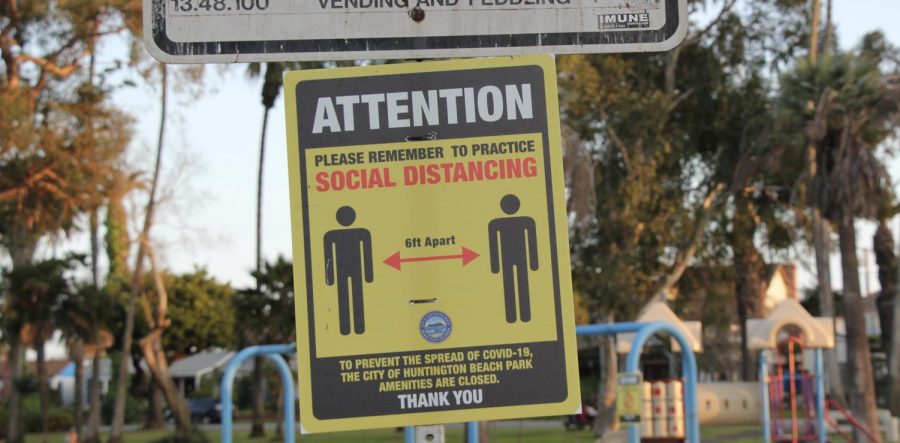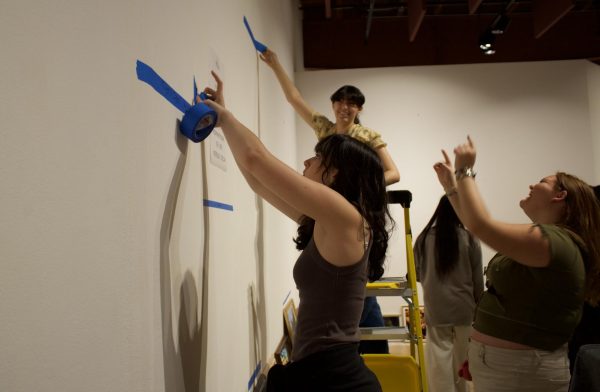Day in the Life of a California Nurse During a Pandemic
Social distancing sign at Lake Park, Huntington Beach, CA.
It has been nearly three months since COVID-19 was first officially declared a pandemic by the World Health Organization (WHO), and has grown increasingly worse each day as many people continue to ignore the “stay-at-home” orders. Though the beaches are as crowded as ever, and many claim that they fail to see the significance of social distancing, the effects of the virus have hit hard within the walls of California hospitals.
Beth Henshaw, a nurse at Dominican Hospital in Santa Cruz, has had to adjust to the unprecedented pandemic within her workplace.
“Patients that have the correct criteria and symptoms for testing are placed in special isolation,” Henshaw said. “Normally, a nurse on my unit would be assigned three to four patients, but with how quickly this virus is spreading, we only assign one nurse to that patient during an entire 12-hour shift. Anyone that does have to go into that room has to wear special protective gear, including a special helmet…that filters the air.”
Though Henshaw personally has not worked with or treated anyone with the virus, her hospital has reported multiple cases already. She explained that if someone displays symptoms of Coronavirus, they are immediately isolated until proven positive or not. People who are confirmed to have the Coronavirus receive very little contact from anybody, including minimal doctor or nurse contact in non-urgent cases.
But what is a Coronavirus? The title “Coronavirus,” in this case, is a bit of a misconception in itself. According to the World Health Organization, the Coronavirus was intended as a label for a series of related viruses that stems from mammals and birds, which ranges from the common cold to respiratory tract infections. Very rarely have these viruses proven lethal, but there have been several well-documented cases including SARS, MERS, and now, of course, COVID-19. As of now, medical professionals have yet to find a permanent and one-hundred percent effective vaccine for Coronaviruses, but many companies and organizations are diligently researching and experimenting at the moment.
According to the John Hopkins Bloomberg School for Public Health’s daily COVID-19 newsletter, the United States is almost at two-million cases of the Coronavirus, with the “total… [reaching] 100,000 deaths.”
For nurses like Henshaw, the global pandemic has taken a toll on not only her work life, but her family life as well. She no longer changes into her scrubs at work, and she now cleans all of her tools and personal items such as shoes, stethoscope, pens, and badge with bleach wipes. As soon as she gets home, she puts her clothes into the wash and immediately takes a shower before even greeting her family.
“Day to day at home, shoes are not allowed in the house,” she affirmed. “We wash our hands a lot more and we’re trying to keep the house cleaner in general.”
According to Henshaw, the best way to avoid the virus on a day-to-day basis is to wash your hands with warm, soapy water for at least twenty seconds.
“You’ve heard this before, but hand washing is key… not only [on] the palms of your hands, [but] the back of your hands and wrists too.”
At this stage of the pandemic, staying home and only going out for essential reasons is vital. After the massive protests in downtown Huntington Beach, over 150 new cases emerged, raising Orange County’s total number of cases to over 4,350 and the death toll to about 90 lives. Now, more than ever, medical professionals everywhere are urging citizens to think of the well-being of their community and to stay inside. No hair appointment or day at the beach is worth a human life.
Henshaw explained “that people are feeling quarantine “fatigue.’” With the state set to reopen, she suggests for everyone to “remain vigilant and [to] not let their guard down too much. Continue to mask, wash hands, and think twice before going into crowded places. The virus hasn’t gone away by any means.”
She maintained that teenagers who do not have an essential cause to go out should stay home. Henshaw wants to remind others that “if you do not need to go out, don’t. This will decrease the chance of you picking something up.”
Many of the youth at our local Huntington Beach High School have treated the social distancing orders–which caused school to close after March 13th–as a time to go out and hang out with friends. In response, Henshaw said, “think about someone… most at risk… a parent [or] grandparent… and think about how they would feel if that person died in the next month or two… Again, it’s not so much about you as it is about helping to protect others. Every time you don’t adhere to the recommendations, you are putting yourself and your loved ones at risk.”
Your donation will support the student journalists of Huntington Beach High School. Your contribution will allow us to cover our annual website hosting costs.
Thank you for supporting our program!












